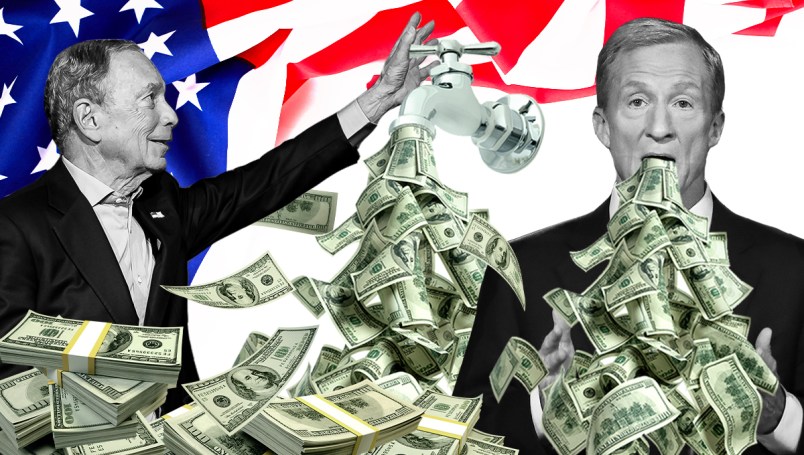Can you believe billboards that mocked President Donald Trump for cheating at golf and eating burnt steak didn’t have the 99 percent tripping over itself to vote for Michael Bloomberg?
The former New York City mayor (net worth $58.4 billion) and Democratic megadonor Tom Steyer (net worth $1.6 billion) dropped into the 2020 Democratic primary race in golden parachutes and poured over $500 million and $250 million into their respective campaigns.
And yet those massive cashflows yielded little beyond a modest bump in the polls (and only in South Carolina, in Steyer’s case). A disastrous Super Tuesday forced Bloomberg to end his campaign on Wednesday, a little over a week after Steyer took his own off life support.
It turns out the 1 percent can’t actually spend their way to the White House after all, something even Trump, a billionaire himself, apparently recognizes.
“Pandering Mini Mike Bloomberg, along with his wacky friend, Tom Steyer, have found out the hard way that you can’t buy the election!” he tweeted.
So what went wrong for Bloomberg and Steyer? For starters, it wasn’t exactly a great year for billionaires to join the race.
Sens. Bernie Sanders (I-VT) and Elizabeth Warren (D-MA) have been hammering against wealthy people’s disproportionate sway over U.S. politics since they launched their bids, and Steyer and Bloomberg’s campaigns proved their point perfectly.
“Running against people like Sanders and Warren didn’t make it easy,” Professor Todd Belt, the director of George Washington University’s Political Management program at the Graduate School of Political Management, told TPM on Wednesday.
And their billionaire status still wouldn’t have done them any favors even without the two progressive senators in the equation.
“Americans are skeptical of those who use wealth to buy the election, especially Democrats,” Belt said.
The Republican party, in contrast, is friendlier to the ultra-wealthy, which is one reason then-candidate Donald Trump didn’t face the same problem in 2016. Another important factor: Trump ran on an actual platform with his cries for a border wall and crackdowns on immigration.
“Trump had very specific policy proposals,” Belt said.
And that’s where Bloomberg and Steyer hit another snag.
Their primary campaign efforts were about increasing name recognition with massive ad blitzes, but the ads offered little in the way of substance. That proved to be a big issue, particularly for Steyer.
“He had no electoral or political record to run on, no base of support,” Michael Gordon, a Democratic strategist who served as a spokesperson for the Justice Department under former President Bill Clinton’s administration, told TPM.
Sure, Steyer appeared in virtually every single one of the debates to make a case for his ability to connect to voters… but he didn’t make that case very well.
“Money can’t buy a personality,” Gordon said, describing the billionaire as “wooden.” Bloomberg had the same problem.
“When you’re a politician, you need to be able to connect with people on a human level, and he failed that test,” the former Clinton official said.
At least Bloomberg had experience as a mayor and was known for his activism on gun control and climate change. His ad campaign further raised his profile – but then people got to know him a little too well.
“Ads can get people to learn about you, but they aren’t going to love what they learn,” Belt said.
Not only did Bloomberg’s ads fail to lay out any meaningful policy positions, the rise in prominence they propelled also exposed the many skeletons in his closet.
Soon after joining the race, the former mayor was forced to answer to his racist stop-and-frisk policy (which he had defended as recently as 2015 while claiming all crime happened in minority neighborhoods). The astonishingly misogynistic comments he’d made to and about his female employees at Bloomberg LP were exposed. A 2016 audio tape of him telling a room full of Goldman-Sachs financiers he’d “defend the banks” as president was published. With every passing scandal, it became harder and harder to distinguish Bloomberg from the man he had vowed to defeat in November.
Two dismal debate performances and one devastating Super Tuesday later, Bloomberg’s campaign crumbled and so too did the notion that truckloads of cash alone will carry you to the highest office in the land.
“Money is a factor,” Gordon said. “It’s not the only factor.”







I’m dismayed that Elizabeth Warren has been and continues to be disregarded by so many.
She has ideas, brains and guts.
Two Billionaires Tried To Buy A Presidency. How’d That Go?
Not well, considering we still have a fake billionaire President…
I think I read that in many of the states that Biden won, he did not campaign nor spend any $$$.
How does that fit in with the Bernie Bro’s narrative?
In Steyer’s case I found him unlikeable, a stuffed shirt. While that isn’t enough to put me off a candidate, he is also a non-politician, a government novice, and I am tired of these businessmen thinking they have all the answers because they ran a corporation-- the US government is not a business, it’s not about turning a profit or making a better mousetrap, it’s about solving problems that the market can’t solve.
Their true character will be revealed in how they spend money between now and Nov.
Required: hard-hitting factual anti-†Я☭mp ads + voter-suppression fights + get-out-the-vote programs.